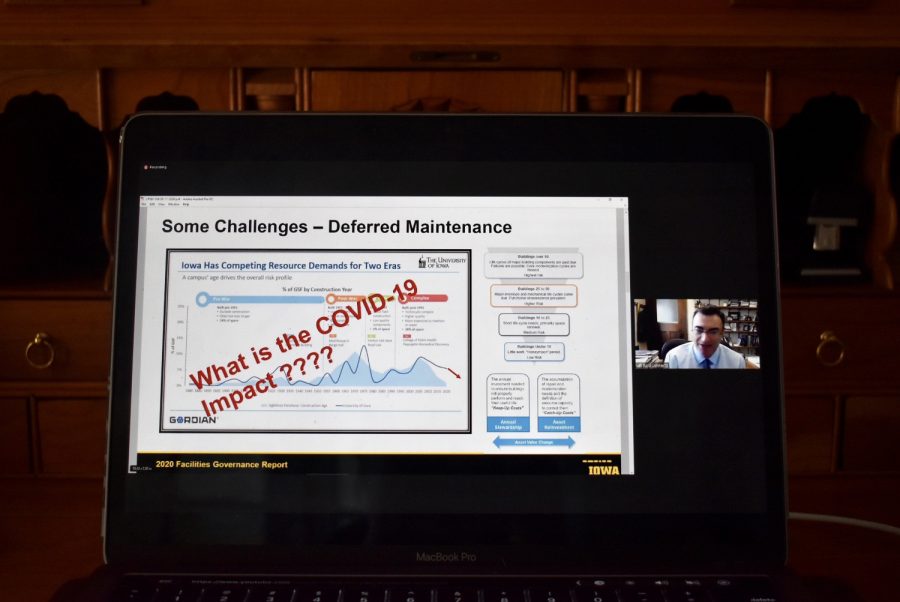Regents consider approval of deferred maintenance funding request of $30 million for fiscal 2022
The state Board of Regents heard requests from institutional leaders to request $30 million in state funding to cover costs of various deferred maintenance projects.
Rod Lehnertz, Senior Vice President for Finance and Operations, gives a presentation to the Board of Regents on Thursday Sept. 17. Lehnertz discussed building projects the the university had underway and how COVID-19 was impacting the projects.
September 17, 2020
The state Board of Regents will consider approval of a state-appropriations request totaling $30 million for fiscal 2022, to be allocated toward deferred-maintenance projects at each of its institutions.
In a virtual meeting Thursday, Board of Regents Director of Facilities John Nash presented the regents with a six-year capital plan for state funds. Of the requested $368 million, $268 million would fund renovations, additions, and replacements and $100 million would fund deferred maintenance, safety, security, compliance, and conservation projects, according to regent documents.
“This year we have pushed all projects ahead one year, so that the only request for FY 2022, is a $30 million request for deferred maintenance,” Nash said. “… That’s the only request we have, and we are obviously trying to draw attention to deferred maintenance and we have good reason for doing that.”
State funding would have a positive effect on the reduction of the regents’ $1.2 billion in outstanding deferred maintenance in General Education Fund buildings and utilities and $9 million in outstanding fire-safety projects, regents’ documents state.
From fiscal 1993 to 2020, regent institutions completed $579 million in deferred-maintenance projects in General-Education Fund facilities, according to regent documents. For fiscal 2021, $32 million is slated for deferred maintenance, which is down $46 million from the previous year.
The average capital request for regent institutions was $74 million over the last 21 years, making the request of $30 million for fiscal 2022 a 59 percent decrease in proposed state funds. Nash said circumstances brought on by the coronavirus pandemic and the derecho in August were considered when the regents’ Property and Facilities Committee formed its request.
According to regent documents, the UI had a 4.5 percent increase in outstanding deferred maintenance this year.
University of Iowa Senior Vice President for Finance and Operations Rod Lehnertz said the UI would prioritize deferred maintenance in the UI Carver Biomedical Research Building, Lindquist Center, Eckstein Medical Research Building, Chemistry Building, and the Pappajohn Business Building. The financial needs of the five buildings total about $8 million, Lehnertz said.
Another four buildings — the Iowa Memorial Union, Theatre Building, Bowen Science Building, and Medical Laboratories — are further down the UI’s list of high-priority deferred maintenance and need $4 million total, Lehnertz said.
He added that the current deferred maintenance on the UI campus is more than $400 million.
“No small number,” Lehnertz said. “A part of $30 million obviously doesn’t make that go away, but in our … assessing these kinds of priorities, it allows us to reach an operational balance where those working and learning on campus don’t recognize the challenges of older facilities that we have.”
Part of the UI’s plans to tackle deferred maintenance includes its Pentacrest Modernization project, which is proposed to start as early as July 2021. According to regent documents, this project seeks to restore Macbride, Maclean, and Jessup Halls, and would eliminate about $27 million in deferred maintenance.
The UI received $13 million in bonding authority to restore the three buildings in 2007, however that money was diverted to emergency recovery after the 2008 flood. Essentially, regent documents state, the university is reactivating its request for state funds to modernize the Pentacrest, starting with Maclean Hall.
The university also wants to invest $30 million in university funds to renovate the University Capitol Center, Calvin Hall, Jefferson Building, and additional spaces on campus, according to regent documents.
Lehnertz said General Education Fund buildings on campus average more than 50 years of age.
“When we say we build them to last — we do,” Lehnertz said. “But it does take great care.”
The regents will vote upon approval of the fiscal 2022 capital-funding request at its Sept. 23 meeting.



